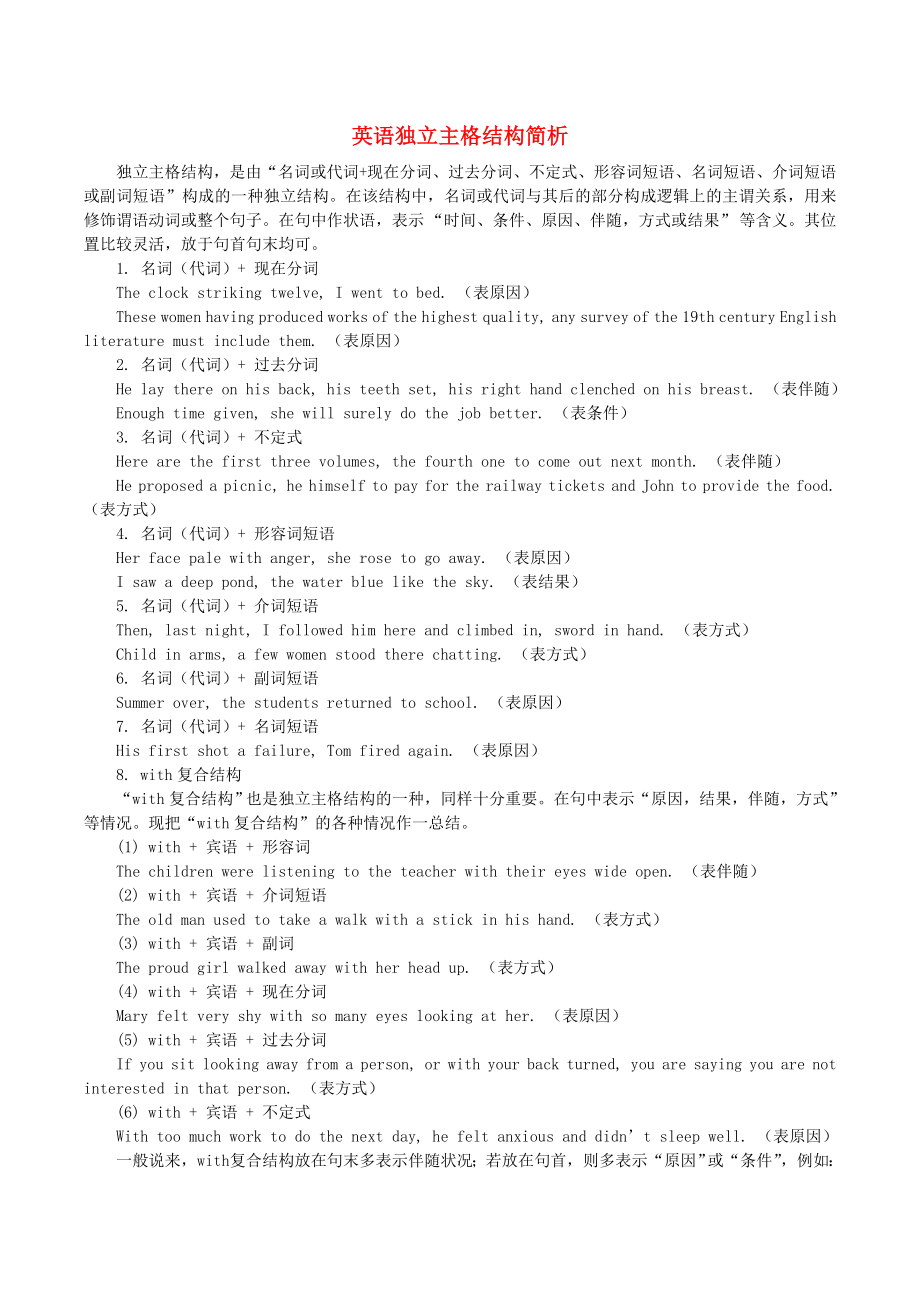《2015年高中英語疑難探究 英語獨(dú)立主格結(jié)構(gòu)簡析素材》由會(huì)員分享�����,可在線閱讀����,更多相關(guān)《2015年高中英語疑難探究 英語獨(dú)立主格結(jié)構(gòu)簡析素材(2頁珍藏版)》請?jiān)谘b配圖網(wǎng)上搜索。
1����、英語獨(dú)立主格結(jié)構(gòu)簡析
獨(dú)立主格結(jié)構(gòu)����,是由“名詞或代詞+現(xiàn)在分詞���、過去分詞�、不定式�����、形容詞短語���、名詞短語���、介詞短語或副詞短語”構(gòu)成的一種獨(dú)立結(jié)構(gòu)。在該結(jié)構(gòu)中�,名詞或代詞與其后的部分構(gòu)成邏輯上的主謂關(guān)系,用來修飾謂語動(dòng)詞或整個(gè)句子�����。在句中作狀語��,表示 “時(shí)間�、條件、原因��、伴隨��,方式或結(jié)果” 等含義��。其位置比較靈活�����,放于句首句末均可��?��! ?
1. 名詞(代詞)+ 現(xiàn)在分詞
The clock striking twelve, I went to bed. (表原因)
These women having produced works of the highest quality, an
2���、y survey of the 19th century English literature must include them. (表原因)
2. 名詞(代詞)+ 過去分詞
He lay there on his back, his teeth set, his right hand clenched on his breast. (表伴隨)
Enough time given, she will surely do the job better. (表?xiàng)l件)
3. 名詞(代詞)+ 不定式
Here are the first three volumes, t
3、he fourth one to come out next month. (表伴隨)
He proposed a picnic, he himself to pay for the railway tickets and John to provide the food. (表方式)
4. 名詞(代詞)+ 形容詞短語
Her face pale with anger, she rose to go away. (表原因)
I saw a deep pond, the water blue like the sky. (表結(jié)果)
5. 名詞(代詞)+ 介詞短語
4���、
Then, last night, I followed him here and climbed in, sword in hand. (表方式)
Child in arms, a few women stood there chatting. (表方式)
6. 名詞(代詞)+ 副詞短語
Summer over, the students returned to school. (表原因)
7. 名詞(代詞)+ 名詞短語
His first shot a failure, Tom fired again. (表原因)
8. with復(fù)合結(jié)構(gòu)
“w
5���、ith復(fù)合結(jié)構(gòu)”也是獨(dú)立主格結(jié)構(gòu)的一種��,同樣十分重要���。在句中表示“原因,結(jié)果�,伴隨,方式”等情況?�,F(xiàn)把“with復(fù)合結(jié)構(gòu)”的各種情況作一總結(jié)�����?��! ?
(1) with + 賓語 + 形容詞
The children were listening to the teacher with their eyes wide open. (表伴隨)
(2) with + 賓語 + 介詞短語
The old man used to take a walk with a stick in his hand. (表方式)
(3) with + 賓語 + 副詞
The proud
6��、girl walked away with her head up. (表方式)
(4) with + 賓語 + 現(xiàn)在分詞
Mary felt very shy with so many eyes looking at her. (表原因)
(5) with + 賓語 + 過去分詞
If you sit looking away from a person, or with your back turned, you are saying you are not interested in that person. (表方式)
(6) with + 賓語 + 不定
7���、式
With too much work to do the next day, he felt anxious and didn’t sleep well. (表原因)
一般說來,with 復(fù)合結(jié)構(gòu)放在句末多表示伴隨狀況�;若放在句首,則多表示“原因”或“條件”��,例如:
With her mother away from home, the little girl felt lonely. 由于她媽媽不在家,這個(gè)女孩感到很孤單���。
With the guide leading the way, I had no difficulty finding their villa
8�、ge. 因?yàn)橄驅(qū)罚覜]怎么費(fèi)事就找到了他們的村子�。
【特別提示】從上面的各種例句中可以看出���,獨(dú)立主格結(jié)構(gòu)本身不是一個(gè)完整的句子����,它實(shí)際上是一個(gè)含有邏輯主語的某種短語��,用來修飾其它一個(gè)句子的�。
1. 獨(dú)立主格結(jié)構(gòu)的轉(zhuǎn)換
獨(dú)立主格結(jié)構(gòu)可以根據(jù)其語法作用���,進(jìn)行句式轉(zhuǎn)換����。例如:The clock striking twelve, I went to bed.
①轉(zhuǎn)換為狀語從句:When the clock was striking twelve, I went to bed.
②也可以轉(zhuǎn)換成一個(gè)并列句:The clock stuck twelve and I we
9����、nt to bed.
2. 獨(dú)立主格結(jié)構(gòu)與冠詞
在“名詞+ 介詞短語”獨(dú)立主格結(jié)構(gòu)中���,如果邏輯主語和介詞短語中的名詞都是可數(shù)名詞單數(shù),這些名詞前不要用冠詞��,目的為了更加簡練�����?�! ?
He was standing over there, pipe in mouth.
Flag on shoulder, the soldier rushed to the top of the building.
但若與with連用�,名詞前則要加冠詞或物主代詞。如:
Then, last night, I followed him here and climbed in, with a sword in his hand.
3. 獨(dú)立主格結(jié)構(gòu)中being 的省略
在下列句子中��,being 可以省略���,若不省略���,則是現(xiàn)在分詞短語?�! ?
Summer (being) over, the students returned to school.
His first shot (being) a failure, Tom fired again.
Her face (being) pale with anger, she rose to go away.
 2015年高中英語疑難探究 英語獨(dú)立主格結(jié)構(gòu)簡析素材
2015年高中英語疑難探究 英語獨(dú)立主格結(jié)構(gòu)簡析素材

